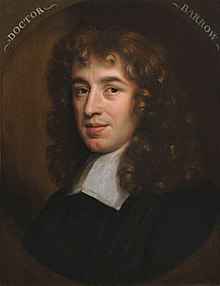Isaac Barrow | |
|---|---|
 Portrait of Barrow by Mary Beale | |
| Born | October 1630 London, England |
| Died | 4 May 1677 (aged 46) London, England |
| Nationality | English |
| Education | Felsted School, Trinity College, Cambridge |
| Known for | Fundamental theorem of calculus Optics |
| Scientific career | |
| Fields | Mathematics |
| Institutions | Trinity College, Cambridge, Gresham College |
| Academic advisors | James Duport |
| Notable students | Isaac Newton |
| Notes | |
His mentor was James Duport who was a classicist, but Barrow really learned his mathematics by working under Gilles Personne de Roberval in Paris and Vincenzo Viviani in Florence. | |
Isaac Barrow (October 1630 – 4 May 1677) was an English Christian theologian and mathematician who is generally given credit for his early role in the development of infinitesimal calculus; in particular, for proof of the fundamental theorem of calculus.[1] His work centered on the properties of the tangent; Barrow was the first to calculate the tangents of the kappa curve. He is also notable for being the inaugural holder of the prestigious Lucasian Professorship of Mathematics, a post later held by his student, Isaac Newton.
- ^ Child, James Mark; Barrow, Isaac (1916). The Geometrical Lectures of Isaac Barrow. Chicago: Open Court Publishing Company.